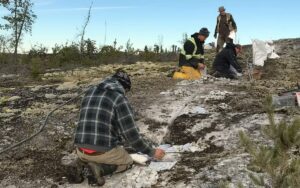Ontario junior mining company says study results confirm it’s tracking to be the “lowest-cost producer of spodumene concentrate” in North America

Frontier Lithium says its PAK Project may be worth $11 billion, according to the results of its new DFS. Photo: Frontier Lithium
Ontario junior mining company says study results confirm it’s tracking to be the “lowest-cost producer of spodumene concentrate” in North America
Frontier Lithium, a junior mining company based in Ontario, announced that the results of a Definitive Feasibility Study (DFS) into its PAK project estimate $11 billion in net revenue over the mine’s 31-year lifespan.
The disclosure was made at the annual Mines-to-Mobility Conference held by the Greater City of Sudbury from May 28-29.
The study marks a 37 per cent boost in mineral reserves, an after-tax net present value of $932 million and a total of over $1 billion in federal and $699 million in provincial tax revenues during the mine’s lifespan.
“We’re developing a high-quality, large-scale, low-cost lithium resource to anchor a domestic supply chain — strengthening energy security, competitiveness, and sustainability,” said Trevor Walker, president and CEO of Frontier Lithium, in a press release.
“This is more than a lithium project — it’s about nation-building and delivering long-term value to shareholders and generations of Canadians, including northern and Indigenous communities.”
Good news
Frontier Lithium’s statement that they are “pleased” with the DFS results may be downplaying the reaction.
The junior mining company has worked for years to get its project launched and to get shovels into the ground. Frontier Lithium is aiming to produce battery-grade lithium hydroxide and lithium salts and sell the product — primarily to the developing North American EV battery supply chain.
With that objective in mind, the company already confirmed its first OEM buyer, Mitsubishi Motors Corporation, last year. Frontier and the Japanese automaker entered a joint venture in March 2024 for the PAK mine and refinery project.
The agreement called for Mitsubishi to take 7.5 per cent interest in the PAK project for $25 million. However, a clause in the agreement states that, following the DFS, Mitsubishi would be permitted to increase its stake in the joint venture to 25 per cent, “through the purchase of additional shares at a price based on the net value of the Project as shown in the DFS.”
“We’re very pleased with the release of this DFS, which marks an important step forward for the project just over a year after our investment,” said Kota Ikenishi, General Manager of Battery Minerals Department at Mitsubishi Motors Corporation in a press statement.
“The DFS results highlight the project’s outstanding quality and scale, showing that it stands among the top-tier lithium projects in North America. We look forward to continue working closely with our partner as the project moves toward production.”
Next steps
Moving forward, Frontier (and Mitsubishi) are looking to advance a final investment decision target. The goal, says Frontier, is to have this underway in the next 24 months.
As well, Frontier is looking to move forward on developing a vacant industrial site it acquired on Mission Island in Thunder Bay, Ont. The site is intended to house Frontier’s lithium conversion facility.
At scale, the hope is the PAK project will produce 200,000 tonnes of chemical-grade concentrate annually and support 230 jobs.
While the company doesn’t give a date for the project to come online, key pieces of infrastructure like bridges and roads, are set to begin construction this year. These elements are needed to provide easier access to the Pakegama Lake site, situated near Red Lake in northwest Ontario.
Frontier estimates its next round of permits for the final investment decision target will come in 2027.






